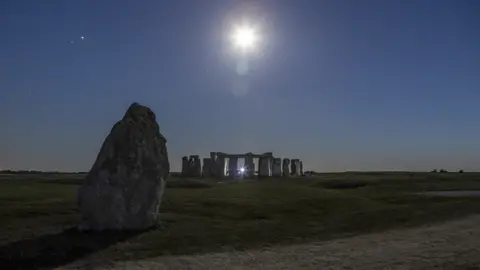Project investigates Stonehenge's link with Moon
 Bournemouth University
Bournemouth UniversityBournemouth University academics and students continue to work on a major study which looks at whether Stonehenge aligns with the positions of the Moon.
It started in April and explores the relationship between the monument and a major lunar standstill, which happens once every 18.6 years.
That is when moonrise and moonset are furthest apart along the horizon.
Saturday is the winter solstice, when the Earth is at its furthest point from the Sun.
Fabio Silva, the deputy head of the Bournemouth University's department of archaeology and anthropology, said: "We already know that the architecture of Stonehenge is one of the earliest examples of prehistoric people investigating and documenting the position of the sun.
"We have a rare opportunity to investigate a major lunar standstill and understand whether the architecture of the stones was also influenced by those early humans observing the positions of the moon," Dr Silva added.
Bournemouth students have visited Stonehenge throughout 2024 to recognise the moonrises and moonsets when the Moon can be seen to be aligned with the Station Stones.
They are elements of the prehistoric monument. There were originally four stones, resembling the four corners of a rectangle but only two remain.
Stonehenge is widely known for its connection to the movements of the Sun, in particular at summer solstice, when thousands flock to the monument in the early hours to witness the sunrise.
You can follow BBC Dorset on Facebook, X (Twitter), or Instagram.
